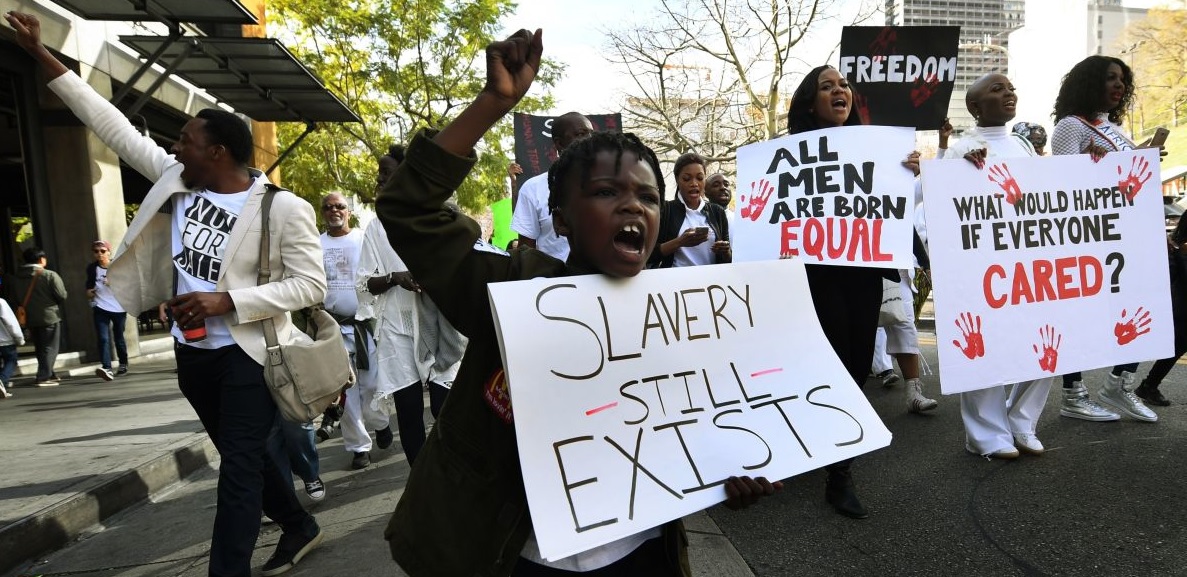As Nigeria joins the rest of the world to mark the International Day for the Abolition of Slavery, concerned citizens say widespread awareness would help checkmate the various forms which slavery has evolved in modern-day society.
Background: Modern-day slavery and its prevalence in Nigeria
According to antislavery.org, modern slavery is the severe exploitation of other people for personal or commercial gain.
Although the trans-Atlantic slave trade had, for long, been abolished in Nigeria, citizens of Africa's most populous nation are experiencing the resurgence of slavery that manifests in several forms that are subtle, concealed, and undefended.
Global Slavery Index (GSI) in its 2018 report revealed that no fewer than 1,386,000 people are living in slavery in Nigeria, a figure which is more than West Africa's total of 1,081,000.
In other words, Nigeria has the odious reputation of hosting the largest number of enslaved people in sub-Sahara Africa.
Forms that modern-day slavery take in Nigeria
A cross-section of concerned citizens who spoke to Timeline.ng on the matter identified some of the major forms that modern slavery rears its ugly head in Nigeria as child labour, forced marriage, debt bondage and forced labour.
Others are the unlawful confinement of girls in ‘baby factories’ (illegal clinics and orphanages) as well as the exploitation of girls and women by terrorist groups.
Factors encouraging the practice in Nigeria
"Poverty is the bedrock of evils bar none modern-day slavery," said a legal practitioner, Walter Omoba. According to him, most of the forms which modern slavery manifests have roots in resource insecurity.
"Take debt bondage, for instance, do well-off individuals find themselves being forced to work in order to pay off debts?" he quizzed.
Also lending her voice to the subject matter, a banker Joy Sadibo identified social exclusion as one of the factors encouraging modern-day slavery.
"There is a thin line between social exclusion and poverty," she said, adding that "where social exclusion exists, people suffer disconnect about their place in society and are amenable to practices that rid them of their dignity.
For Abraham Kure, obnoxious cultural practices are to be blamed for the ugly trend of modern slavery.
"It is has become sort of a cultural practice for parents and guardians to entrust their children or wards to the care of persons they believe are better positioned to train them," said the corp member and graduate of project management.
"3 in every 5 child labourers were willed out to work by parents/guardians who have no clue about what they signed up the child for.
"It is also hard to disentangle the place of obnoxious cultural practice in forced marriage," he added.
What can be done to reduce the prevalence
Owing to the subtle, concealed, and undefended forms which modern slavery manifests, people don't realise that they are being enslaved or aiding and abetting modern-day slavery.
“Hopefully, the commemoration of the International Day for the Abolition of Slavery is one of the means awareness can be raised on the critical issue but a one-day awareness is not enough," remarked Susan a housewife and mother of 2.
"We need to take the awareness to grassroots, it should be made known in places of worship, traditional/cultural gathering and ultimately taught in schools," said Micheal Ogbonna a secondary school teacher.
He went on to note that support from world powers and international organizations like the United Nations Educational, Scientific and Cultural Organization (UNESCO) and International Organization of Migration (IOM) will go a long way in curbing the menace especially as it relates to irregular migration which aids forced labour.
About the International Day for the Abolition of Slavery
The International Day for the Abolition of Slavery is a yearly event on December 2 organized by the United Nations General Assembly.
The day was first celebrated in 1986.
This year's theme is “Ending Slavery’s Legacy of Racism: A Global Imperative for Justice”
The theme reflects the global movement to end injustices whose roots lie in the slave trade.
It highlights the importance of educating about the history of the transatlantic slave trade and slavery, to bring about an acknowledgement of slavery’s impact on the modern world, and action to address its long-lasting effects.
The theme also guides the Programme’s development of educational outreach and remembrance to mobilize action against prejudice, racism and injustice.








